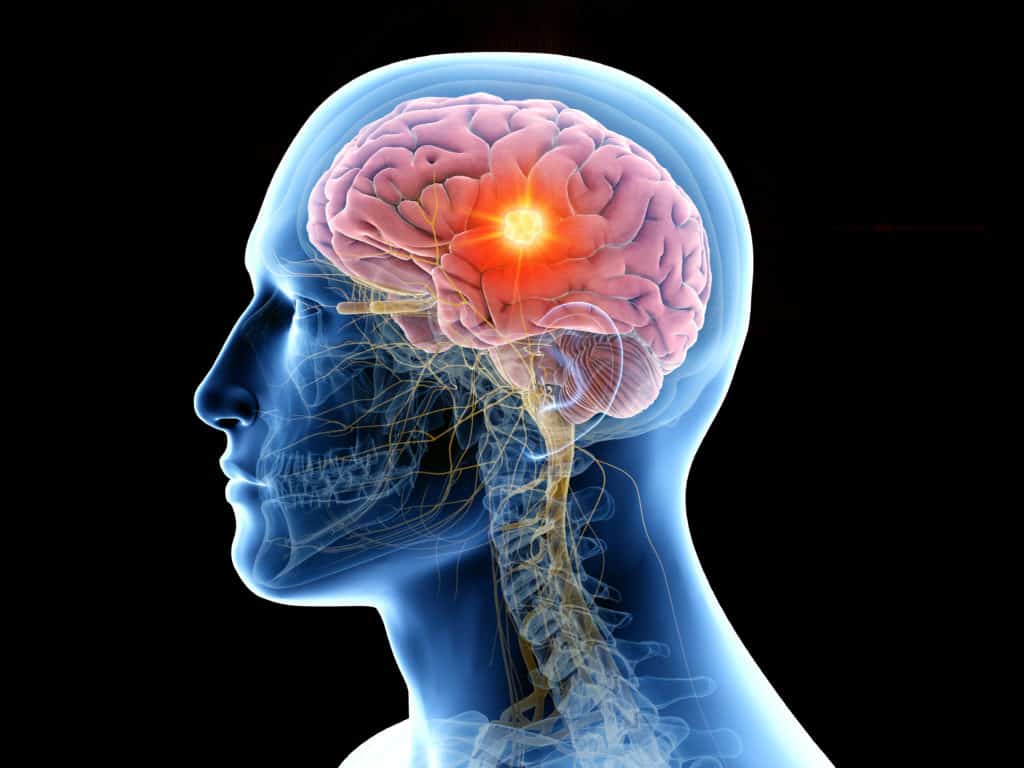The term brain tumour refers to a growth of cells in the brain that multiplies in an abnormal and uncontrolled way. However, technically speaking, there are many different types of brain tumours, each with varying degrees of severity and symptoms.
Brain tumour symptoms
Brain tumour symptoms can be very specific to the area of the brain affected however there are some more common symptoms, including;
- Headaches that are either dull, throbbing or constant
- Seizures
- Nausea and vomiting
- Drowsiness
- Mental or behavioural changes (memory problems, personality changes)
- Vision loss
- Speech problems
- Weakness or paralysis on one side of the body
- General and progressive weakness
These symptoms are typically the result of a build-up of pressure in the brain and consequently the impairment of nearby regions.
Like most tumours, often brain tumours will not show symptoms until they have started to grow larger or spread. As such, it’s important to detect a brain tumour as early as possible so that it can be contained and treated effectively.
The grades of brain tumour
Brain tumours are typically graded by their rate of growth and the likelihood of returning after treatment.
- Grade 1 and 2 (low-grade) tumours are considered benign as they grow slowly, can be contained to some extent, are unlikely to spread to other parts of the brain and are unlikely to return following treatment.
- Grade 3 and 4 (high-grade) tumours are considered malignant or cancerous. This is because they grow quickly, are more likely to spread to other parts of the brain and even spinal cord, and are more likely to return after treatment.
- Mixed grade tumours contain a mixture of cells of different grades but are referred to by the highest grade of cell it contains.
The grading of a brain tumour doesn’t tell the whole story, but it does give an indication of its severity. No matter the grading of the tumour, it’s still a serious condition that must be diagnosed as early as possible in order for the most promising treatment outcomes.
However, usually in the UK we see our GP only once we are experiencing symptoms, by which time the conditions will be worse than if it was caught early, before it had a chance to grow and cause symptoms. Fortunately, by attending a full Health Assessment a brain tumour early detection can, and is, achieved – take a look at our case studies.
Visit The Brain Tumour Charity for more information about how brain tumours are graded.
Types of brain tumour
Brain tumours can be categorised by the part of the brain from which they originate or by the type of cell they develop from;
- Glioma – Over half of all brain tumours are spinal cord gliomas that develop from glial cells. These cells ordinarily provide support to neurons in the brain or spinal cord. Gliomas can be any grade and they can take on characteristics of all grades. They are named after the type of glial cell they start in and include;
- Astrocytomas – the most common glioma that starts in cells called astrocytes. Each grade has a different name; Pilocytic Astrocytoma (Grade 1), Diffuse Astrocytoma (Grade 2), Anaplastic Astrocytoma (Grade 3) and Glioblastoma (Grade 4).
- Oligodendroglioma – develops from a glial cell called an oligodendrocyte which normally provide support and insulation to nerve fibres in the central nervous system.
- Ependymoma – develops from glial ependymal cells which line the centre of the spinal cord and ventricles of the brain, producing cerebrospinal fluid. This is a rare type of glioma.
- Meningioma – Around a quarter of all brain tumours are meningiomas. These tumours start in the membrane that surrounds the brain and spinal cord. Meningiomas are often slow-growing, rarely progressing to grade 4.
- Acoustic Neuroma – Acoustic neuroma, also known as vestibular schwannomas, are tumours that grow slowly and develop from the acoustic nerve that connects the inner ear to the brain. This is not a particularly common brain tumour but those with a genetic condition known as Neurofibromatosis type 2 (NF2) are at a higher risk of developing an acoustic neuroma.
- Primary Central Nervous System Lymphoma – lymphoma is cancer that affects the lymphatic system which is a major component of the body’s immune and circulatory systems. Lymphomas typically start in central nervous system (i.e. the brain and spinal cord) and are called primary central nervous system lymphomas (PCNSL). These tumours are rare and often grow quickly.
- Hemangioblastoma – is a vascular tumour which means it is formed from blood or lymph vessels. Often affecting the central nervous system but can also occur in the retina. It is a rare and slow-growing tumour.
- Medulloblastoma – A high-grade brain tumour that forms in a region at the base of the brain known as the cerebellum, which is important for motor function. This tumour is rare in adults but is sadly the most common type of primary brain cancer in children.
- Pineal Region Tumour – tumours that develop in the pineal gland which is responsible for producing melatonin, a hormone that modulate sleep patterns, among other hormones. These are rare but are most common in people under 20.
- Pituitary Tumour – form in the pituitary gland which is responsible for regulating almost all of our hormones including those responsible for reproduction and stress. Pituitary tumours can therefore result in too much or too little of a hormone. As many as 1 in 4 people have pituitary adenomas, according to the American Cancer Society, however the vast majority of these are benign and harmless and go undiagnosed.
- Craniopharyngioma Tumour – result from the growth of cells that in early foetal development, did not correctly migrate to their usual area. These account for 5-10% of childhood brain tumours but are still rare and fortunately slow growing.
For further detail into the many types of brain tumour, Macmillan Cancer Support provide great information. But regardless of the type or grade of brain tumour, it is always best for them to be detected early and analysed by leading consultant doctors. This is why Echelon Health are proud to provide a high-resolution brain MRI for our Platinum and Evergreen clients. Additionally, we are led by one of the most experienced consultants on Harley Street, Dr Jenkins and your results will be reviewed by up to seven consultant radiologists, each reporting on their particular area of expertise.

Brain tumour diagnosis in London
The rate at which a brain tumour grows will heavily depend on its which cells and tissue it develops in and its grading. However, as with all cancers, the sooner it is detected and the sooner it is treated, the better. The best method of brain tumour diagnosis is a brain MRI and the best place to attend a brain tumour diagnosis in London is Echelon Health who operate a 3 Tesla MRI. This provides a higher resolution than the 1.5 Tesla MRI machines the NHS operate. To read more about brain MRIs, click here.
However, cancer can develop in any tissue in any part of the body which is why a comprehensive screening is important. Echelon Health’s Assessments are the most comprehensive available and are designed with a bespoke approach to your individual health.
In combination with MRI, CT, EOS, ultrasound, ECG and blood tests for over 40 parameters, a Platinum Health Assessment detects for up to 92% of those diseases that lead to premature death in men and 96% in women, according to our independently-verified analysis of data from the Office for National Statistics.
Feel free to contact us today 020 7580 7688 or click the button below and we will be happy to answer any questions you may have.
Make an Enquiry
Sources
The Brain Tumour Charity – How Brain Tumours are graded
American Cancer Society – Key Statistics About Pituitary Tumors



